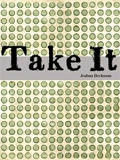Review by Virginia Konchan
TAKE IT
by Joshua Beckman
Wave Books
1938 Fairview Avenue East
Suite 201
Seattle, WA 98102
ISBN 978-1933517377
2009, 88 pp., $14.00
www.wavepoetry.com
The opening epistolary poem of the stately, silly collection Take It, “Dear Angry Mob,” in the voice of “Ranger Lil,” sets the tone for the book, which, ironically, reads more like a book of devotional poetry (albeit tongue-in-cheek) than most other contemporary collections. Beckman’s metaphysical concerns, as in his previous five books, are filtered through the idiom of postmodern pop culture: the result is a prose poetic dense with wounded understanding of heroic proportions.
“I direct you to the grand panorama God has built—” the speaker intones in one of the collection’s 51 untitled poems, adding a few lines later: “The Beckman clan calls for the death of another animal.” Never have the lines between the personal, public and political been so expertly woven: “I do wish I were not so stubborn,/ for I would much prefer to return home to you/ and fill that little bowl with milk myself . . . I dream . . of the spastic dismantling . . . of my enemy.”
Beckman’s soulful theatrics, like those of Dean Young, have taken the humorous lyric to new heights (his previous collections include the 2002 collaborative book project Nice Hat. Thanks. with poet Matthew Roher), but perhaps less readily appreciated is Beckman’s mastery, not just of the quotidian, but of the tragic. Poems that begin “I don’t long, I don’t die, I don’t await/ the departure of those I love,” and end “I have often misunderstood destiny,/ I will misunderstand it no more,” posit Beckman in an entirely new category altogether: that of a postmodern elegist whose focused grieving is for the purposes of self and cultural indictment.
Beckman’s genuine sorrow and grim perception create an impassioned dialogue between the values the Romantics held dear (love of truth, beauty, Nature) and a modern world that could care less. This is the voice of a survivor of spiritual and ecological devastation whose form of social critique is not merely incisive, but ruthless: “We are a failed and ruined people/ incapable of even silence”; “My life is a dream. When they ask, say/ His life is a dream.”
The moments when his high-toned humor turns serious approximate battle cries: “What I have not claimed or executed on behalf/ of my lover, I will this time for you”; “Unmistakable quality will soon be upon us”; and “Judge, for I judge. Judge, for my household judges.”
What rescues Take It from lapsing into a collection of anecdotal confessions is the sincerity (an antiquated word now enjoying a revival) with which he undertakes his task. Lines often take the form of lifeboats, as when Beckman tunes his ear to the apocalyptic wailing from the universe, or the smatters of confused babble that surround the speaker. Fellow Wave Books author Dorothea Lasky’s poem “The Mouth of the Universe is Screaming in Agony” from her collection Awe sings in tandem with Beckman’s line “When one recognizes/ a ghostly squeal from but tacit reminiscences, one is near,/ as they say, the deep end.” Beckman is, furthermore, as unafraid of plunging into blunt scorn as he is of religious polemic: “The earth given to us, we have lost even that./ Big eaters of America, I join you in your parade;” or, from a different poem, “Cross yourself . . . a wind of evil just blew/ through this place.”
“Yes,” Beckman declares mid-way through Take It, as if answering to an invisible arbiter: “I understand folly.” And yes, Colin, the leader of my Irish gang, terrorizes the neighborhood, and yes, there is a snack in your pocket, and do you know why? From “Time worn through as a great task or cloud”: “I put it there.” Lucky are the readers who chance to enter the “bright green, confusing life” Beckman creates for his reader, however mournfully: don’t just take it, he implores, eat it, and give thanks.
Comments are closed.